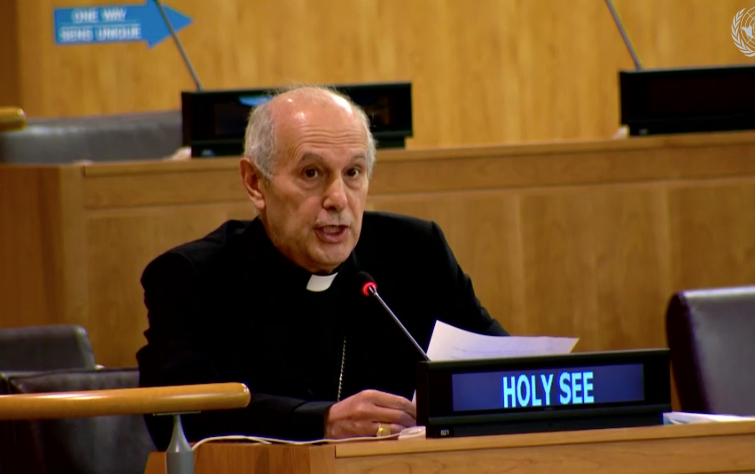
(from New York) The diplomacy of Monsignor Gabriele Giordano Caccia, Archbishop and Permanent Observer of the Holy See to the United Nations, is a “diplomacy of proximity.” His years of service at the nunciatures in Tanzania, Lebanon, the Philippines and at the Secretariat of State, are a token of his commitment. His presence at the United Nations headquarters, following his appointment by the Pope on 16 December 2019, is a further confirmation of this. Born in Milan, a citizen of the world, Monsignor Caccia arrived in New York a few weeks before the city became an epicentre of the coronavirus pandemic, and the man who had opened the doors of the Mission to all, had to close them at once for the imposed lockdown. “After some hesitation, we adjusted to the online platforms”, he said. But this did not stop him from practising “virtual encounter diplomacy.”
Is there a specific encounter, among the many that you had during your time in New York, that impressed you in a special way?
Rather than an encounter, I would describe it as a perception fruit of many meetings with the Ambassadors who work here.
Each one promotes the vision and priorities of the country he or she represents, but
they all share the belief that they are here for something greater, and that they are working for the good of the whole of humanity.
This also allows for meaningful human relations, irrespective of the different positions or official views, in an effort to build bridges, points of contact and dialogue, which is ultimately the essence of diplomatic activity.
24 October marks United Nations Day, whose theme this year is ‘Building Back Together for Peace and Prosperity’. Is there a plan of yours to fulfil this motto?
I would rather describe it as “the plan of Francis”, whose prayers, words, and – most of all – example and activity, usher in avenues for reflection and sharing that will enable us to emerge from the “crisis” as better people, having learned to walk together, starting with the most vulnerable. Here, in communion with the journey of the entire Catholic Church, we seek to pursue his recommendations, make them known, and kick-start processes that may contribute to their implementation.
You mentioned crises, and the United Nations is not exempt either. An overall UN reform has long been called for. Is there a possible contribution that the Holy See Mission could make to this reform process?
The pandemic has shown the world that global problems can only have global solutions, and that if we fail to work together we will often be struggling in vain. In this respect, an intergovernmental organisation can only be effective to the extent that its members (i.e. the States) are willing to work together towards common goals.
If this multilateral spirit is lacking, there is little that can be accomplished at the international level. This is where the Encyclical ” Fratelli Tutti” can contribute to taking a step in the right direction by creating the preconditions for such cooperative spirit.
Vaccines and patents are a theme dear to Pope Francis. Have you been working on initiatives in this area at the UN Headquarters?
There have been several proposals and initiatives that could be summed up as “one vaccine for all”, put into practice with the ”Covax” programme for global equitable access to COVID-19 vaccines. Clearly, numerous challenges surround this issue, touching on spheres and aspects that extend beyond vaccines per se. This is reflected also in the composition of the Vatican Covid-19 Commission, set up by the Holy Father to tackle the epidemic as a whole.
Which specific contribution can faith, Catholicism, offer to the activity of the United Nations?
The values of the Gospel, interpreted by Church social doctrine, whose basic principles were recalled by Pope Francis in his General Audiences during the pandemic, are indeed a leaven that can help bring out the best in every person and every culture for the good of all.
In the first papal visit to the United Nations headquarters in 1965, St Paul VI declared that the aim of the United Nations is to be on the political and diplomatic plane what the Church seeks to achieve on the human and spiritual plane: to serve all people everywhere. In this respect, the expression of solidarity and fraternity, or rather communion, that exists in the Catholic Church is to be both a model and a source of support for the United Nations.
We presume that your diplomatic service is equally marked by complex and challenging moments. Was there one particular incident that made you say: is it worth the effort, the time, the energy, the struggle?
In the Gospel of Luke, the aged Simeon tells Mary that Jesus would be a sign of contradiction. The same happens again in the history of his disciples. In fact, alongside support, respect, admiration, friendship for what the Church proclaims and accomplishes throughout the world, there is no lack of criticism, suspicion, accusations, opposition, according to the issue at stake. However, in this context we see the great freedom of the Holy See. Not being tied to any coalition or interest group it represents the voice of humanity’s innermost values, giving voice to the voiceless in particular, the ones who are most often forgotten or discarded, as the Holy Father often reminds us. It is always worth devoting time, including a certain amount of suffering, to ensuring that the cry of the poor and needy is heard.











